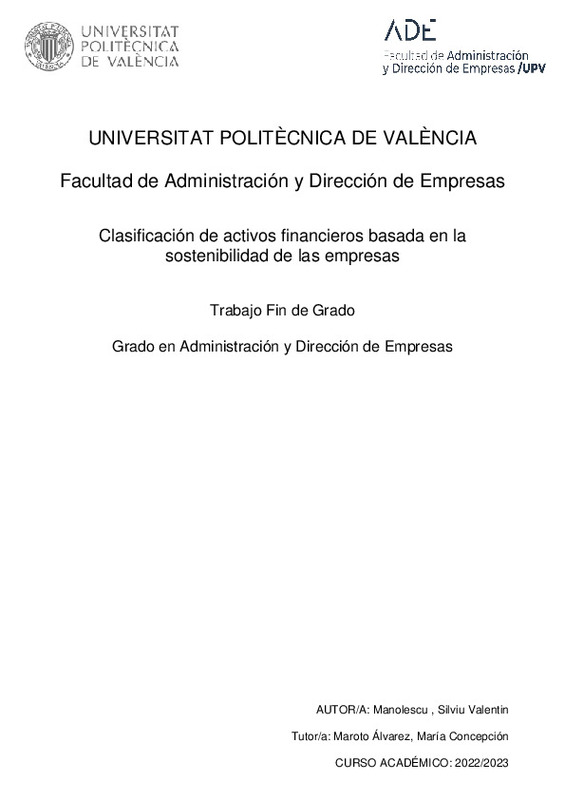|
Resumen:
|
[ES] La creciente relevancia de la sostenibilidad en el mundo empresarial y en el sector financiero en particular ha favorecido la aparición de agencias de calificación ASG y de índices bursátiles que tienen en cuenta ...[+]
[ES] La creciente relevancia de la sostenibilidad en el mundo empresarial y en el sector financiero en particular ha favorecido la aparición de agencias de calificación ASG y de índices bursátiles que tienen en cuenta este aspecto. La Autoridad Europea de Valores y Mercados (2021) considera que es necesario establecer una definición común de criterios y metodologías ante la creciente demanda de activos sostenibles.
El objetivo de este Trabajo Fin de Grado es aplicar una metodología multicriterio para evaluar la sostenibilidad de las empresas que cotizan en bolsa con la finalidad de que los inversores en activos financieros puedan disponer de información suficiente y transparente para su toma de decisiones.
En primer lugar se analizarán las metodologías actuales empleadas por las principales agencias de calificación reconocidas a nivel mundial. Entender el procedimiento de evaluación y el cálculo de la puntuación final de la sostenibilidad de cada empresa permitirá detectar y comparar tanto las fortalezas como las posibles debilidades de cada sistema de evaluación. En segundo lugar, se aplicará la técnica multicriterio PROMETHEE para evaluar la sostenibilidad de las empresas del IBEX-35 que permita clasificarlas y priorizarlas tanto a nivel global como por los distintos criterios que garantizan un desarrollo sostenible. Los resultados permitirán a los inversores disponer de una información transparente y adecuada a sus preferencias.
[-]
[EN] Society's growing concern for sustainability is marking changes in all business
activities. For this reason, the carbon footprint, energy efficiency, responsible production and
inclusion are some of the issues that ...[+]
[EN] Society's growing concern for sustainability is marking changes in all business
activities. For this reason, the carbon footprint, energy efficiency, responsible production and
inclusion are some of the issues that have more and more space in the evolution of companies,
with the ultimate goal of being able to achieve sustainable development.
Traditionally, finance has focused on maximizing economic benefits, but with
society's awareness of the negative impacts of economic growth on the environment, this
model is no longer appropriate. This work relates the concept of finance to sustainability by
recognizing the importance of ESG criteria (environmental, social and good governance) in
financial decisions.
First, the concept of sustainable development and its relationship with finance through
assets are explained in order to understand how these integrate beneficial criteria for society
and the planet. Secondly, different methodologies of entities dedicated to evaluating the
sustainability of companies are analyzed, seeing that there are multiple deficiencies in the
realization and that they could be improved. Third, different multi-criteria models are
proposed that take into account the economic and sustainability dimension to create a
classification of companies adapted to the preferences of an investor.
Finally, the results obtained are analyzed in order to have a list of companies that
meets the needs of the investor according to their profile while integrating the ESG criteria.
All this is done with a methodology that has an advantage over those used by rating agencies
as it is more transparent and penalizes companies with neglected sustainable criteria more.
[-]
|







